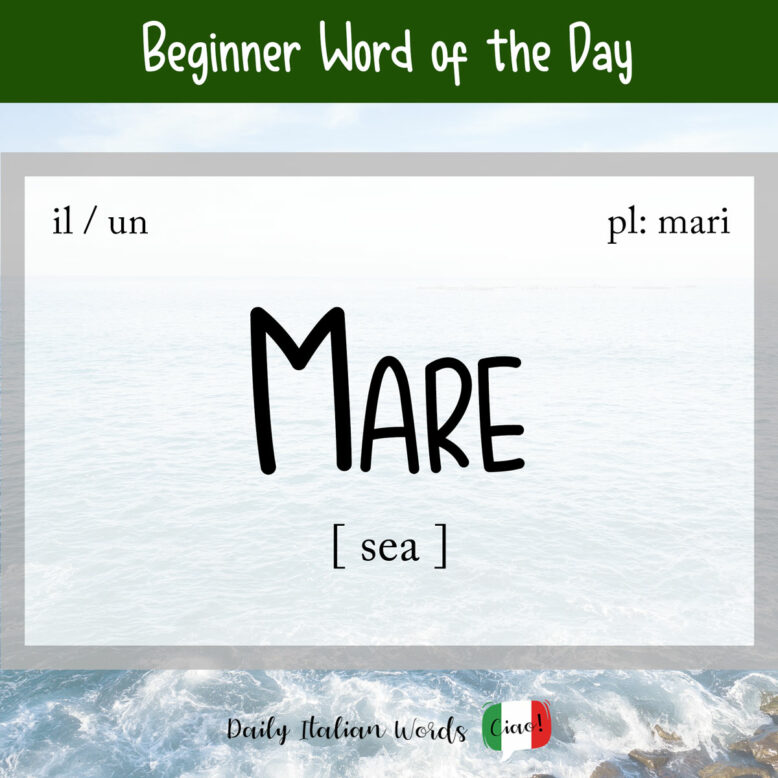Do you enjoy spending time by the seaside? Then you will love today’s word! The sea in Italian translates as mare, which should be easy to remember as it closely resembles the English word marine. It derives from the Latin mare of the same spelling.

It is a masculine noun that takes the following definite and indefinite articles:
- il mare = the sea
- un mare = a sea
- i mari = the seas
- dei mari = some seas
There are numerous adjectives you can use to describe the state of the sea, but here are some of the most commonly used:
mare grosso = rough sea / choppy
mare in burrasca = stormy sea
mare mosso = rough sea / choppy
mare calmo = calm sea
mare agitato = rough sea / choppy
mare piatto = dead calm sea
Non farei un bagno nel mare quando è mosso.
I wouldn’t go swimming in the sea when it’s rough.

An interesting expression used to describe a very calm sea is un mare liscio come l’olio which literally means “a sea as smooth as oil”.
When you see the expression al mare, the speaker is referring to the seaside as a whole rather than just the sea itself:
- andare al mare = to go to the seaside
- trascorrere una settimana al mare = to spend a week at the seaside
- passare tutta l’estate al mare = to spend the whole summer at the seaside
- una casa al mare = beach house
Gente di mare refers to sea-faring folk whereas un lupo di mare, literally “a wolf of the sea”, is what we would call a sea dog or old salt in English, or in other words, an old or experienced sailor.
Here are some of the world’s most famous seas. As you can see, Mare is often abbreviated to Mar in names.
- il Mar Mediterraneo = the Mediterranean Sea
- il Mar Baltico = the Baltic Sea
- il Mar Morto = the Dead Sea
- il Mar Rosso = the Red Sea
- il Mar Caspio = the Caspian Sea
- il Mar dei Caraibi = the Caribbean Sea
- il Mare del Nord = the North Sea
- il Mar della Cina = the China Sea
Mare is sometimes used in a figurative sense to denote “a lot of” something. For example, if your child is inundated in homework over the summer break, you could say he has un mare di compiti (lit. a sea of homework).
È finito in un mare di guai.
He ended up in a lot of trouble.
If you call a place un porto di mare (lit. a seaport), on the other hand, you are suggesting that it is a place frequented by a large number of people who continually come and go.

Idioms featuring the word ‘mare’
The sea features heavily in the lives of human beings, so it should come as no surprise to see it in various idiomatic expressions.
Essere in alto mare
Literal translation: to be on the high seas
English meaning: to be in the weeds, to have many so problems that you find it hard to deal with the situation
Cercare per terra e per mare
Literal translation: to search the land and sea
English meaning: to search high and low
Essere una goccia nel mare
Literal translation: to be a drop in the sea
English meaning: to be a drop in the ocean
(S)muovere mari e monti
Literal translation: to move seas and mountains
English meaning: to move heaven and earth, to bend over backwards
Promettere mari e monti
Literal translation: to promise seas and mountains
English meaning: to promise (someone) the moon and the stars
Heather Broster is a graduate with honours in linguistics from the University of Western Ontario. She is an aspiring polyglot, proficient in English and Italian, as well as Japanese, Welsh, and French to varying degrees of fluency. Originally from Toronto, Heather has resided in various countries, notably Italy for a period of six years. Her primary focus lies in the fields of language acquisition, education, and bilingual instruction.


